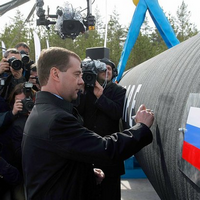With energy market observers focused on the Middle Eastern uprisings and the Japanese catastrophe, the entrance on March 21 of the German company Wintershall into the consortium backing the South Stream pipeline came as a great surprise. Inaugurated in 2007 as a 50-50 joint venture between Russian giant Gazprom and Italy's ENI, the project aims to transport up to 63 billion cubic meters (bcm) of natural gas per year from the eastern shore of the Black Sea to the consuming markets of Eastern, Central and Southern Europe. According to the memorandum of understanding signed in Moscow, Wintershall will acquire a 15 percent stake in the company, with Gazprom maintaining control over 50 percent of the shares. ENI will be left with 25 percent, with the remaining 10 percent to be handed to France's EDF by the end of the year.
The participation by Wintershall, a subsidiary of the German chemistry giant BASF, will revitalize a project that just a few weeks ago seemed destined to be quietly shelved. South Stream faces fierce competition from Nabucco, an alternative pipeline project benefitting from Washington's blessing as well as the active support of the European Union and several international financial institutions. Moreover, the outlook for a European gas market flooded by cheap liquefied natural gas (LNG) during a period of crisis-induced low demand had dampened the appeal of another ambitious infrastructure project. Rumors about repeated disputes between Gazprom and ENI, reinforced by ENI CEO Paolo Scaroni's March 2010 proposal to merge South Stream and Nabucco, were further clues pointing to an imminent suspension of the project.
The situation had worsened by the beginning of 2011. On Jan. 13, European Commission President José Manuel Barroso and Commissioner for Energy Günther Oettinger flew to Baku to release a joint declaration with Azerbaijani President Ilham Aliyev. Although not legally binding, the document states that the 10 bcm per year coming from the Shah Deniz Phase II gas field will be sold to Europe, providing Nabucco with much-needed access to upstream supply. This looked like a blow for South Stream which, lacking official supply commitments, was expected to be filled with Caspian gas contracted by Gazprom and diverted to the Russian network.

